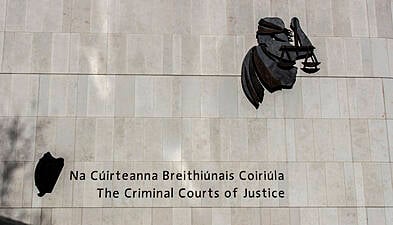A man who was jailed for having a firearm at a halting site - where he was heard saying "I'll kill you all; man, woman or child" - should not have been jailed as his conviction was "perverse", his lawyers have told the Court of Appeal.
In March 2021, Simon Quilligan, who was found not guilty of an attempted murder at the site, was sentenced to six years' imprisonment at the Central Criminal Court for the possession of a firearm with the intent to endanger life at the same location.
The sentencing judge, Mr Justice Michael MacGrath, described the evidence at trial as "painting a rather horrifying picture" of adults and children being "terrorised" by the incident.
Following a trial at the Central Criminal Court in December 2020, the jury found Quilligan not guilty of attempting to murder John McDonagh at Arden Way, Tullamore, Co Offaly, on May 5th, 2018.
The father of four was also found not guilty of intentionally or recklessly engaging in conduct, namely the discharge of a firearm, which created a substantial risk of death or serious harm to another.
He was further found not guilty of making a threat to Melissa Cowman, intending the said Melissa Cowman to believe it would be carried out.
However, the jurors found Quilligan guilty of possessing a firearm with intent to endanger life on the same occasion.
He was also found guilty of making a threat to Sandra O’Brien and Victoria Doherty, intending them to believe it would be carried out, to kill or cause them serious harm on the same occasion.
The defendant was further found guilty of damaging property, to wit, a window of Victoria Doherty’s caravan, intending to damage such property or being reckless as to whether such property would be damaged on the same date.
Threat to kill
Mr Justice MacGrath sentenced Quilligan to eight years' imprisonment with the final two years suspended for possession of the firearm with intent to endanger life, to two years for the two counts of threat to kill or cause serious harm and to six months for the criminal damage, with all terms to run concurrently.
The court was told that there had been "bad blood going back awhile" between the Quilligan and McDonagh families but that this was "all in the past now" with the judge adding that there was "evidence of hope" that a relationship between the families could be fostered in the future.
Quilligan (40), with a previous address at Blackberry Lane, Athlone, Co Westmeath, had denied (DENIED) all seven charges and appealed the conviction for the firearms offence.
At the Court of Appeal on Tuesday, Padraig Dwyer SC, for Quilligan, described the conviction for possessing a firearm as "perverse" due to the "insufficient evidence" that the trial judge allowed to go before the jury that amounted to an "error in law or fact".
Mr Dwyer submitted to the three-judge court that John McDonagh gave evidence at the trial describing a firearm in the possession of Quilligan but that Mr McDonagh "could not clearly see a gun or indeed hear shots from a gun".
The barrister submitted that Ms Cowman told the trial that she heard a "gas noise" from the gun and that "there was no shooting noise". "She did not hear a bang consistent with a firearm," he said.
Witness Rosemarie Leonard gave evidence of not "seeing or hearing" a firearm and had only said Quilligan had "something in his hand", said Mr Dwyer.
Mr Dwyer said there was no firearm residue evidence and that no silencer had been found at the site.
"The verdict is perverse, having regard to all the circumstances of the case and the totality of the evidence adduced, as summarised by the trial judge and having regard to the onus of proof required to be discharged by the prosecution," said the barrister.
Attempted murder
Mr Dwyer also contends the firearm offence to be a perverse verdict as it is "inconsistent" with the acquittals of the attempted murder and of endangerment arising from the "reckless discharge of a firearm".
Mr Justice John Edwards said whether it was a firearm or an air-gun "it was certainly possessed by your client", adding that people at the site dived under caravans, ran for hedges and hid in a nearby B&B.
"We don't say there is possession with intent to endanger life," said Mr Dwyer.
The barrister said the attempted murder and the endangerment charges required it to be proven that Quilligan had formed a criminal intent and their dismissal overlapped with the possession of the firearm charge leading to an "inconsistent verdict".
Mr Dwyer said for a person to be found guilty of Quilligan's firearm offence they "had to have the intent to endanger life".

Mr Justice Edwards he was looking at the "entire circumstances, where he [Quilligan] was in possession of a weapon and while holding it he uttered threats to kill and people were put in fear".
Mr Justice Patrick McCarthy asked Mr Dwyer if he was seeking to have the conviction quashed on grounds of inconsistency and was told this was the case.
Mr Dwyer agreed with Mr Justice McCarthy who said it was the appellant's position that the firearm possession with intent to endanger life was "on all fours with the other charges, meaning you couldn't have an acquittal on just those two charges".
Mr Justice Edwards, presiding, said the court would reserve its judgement.







